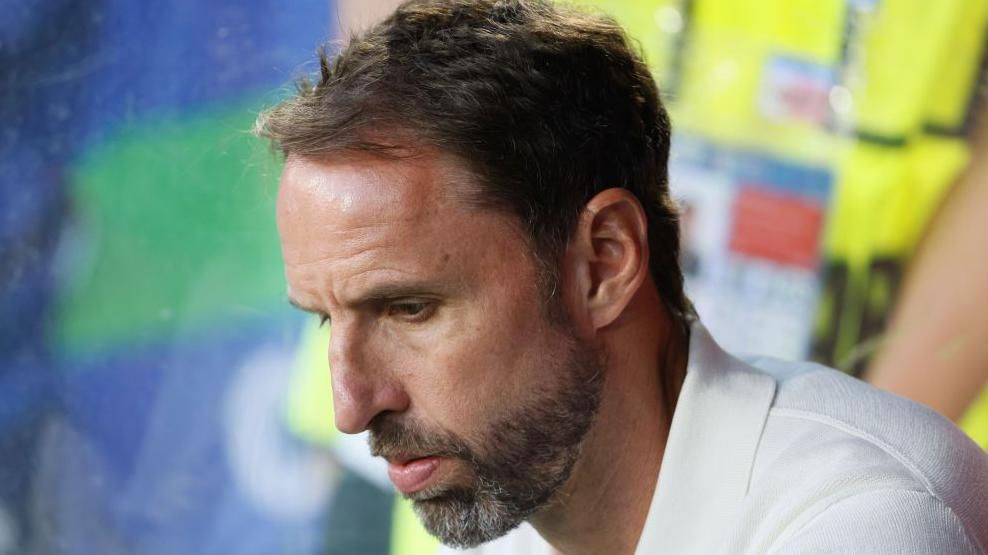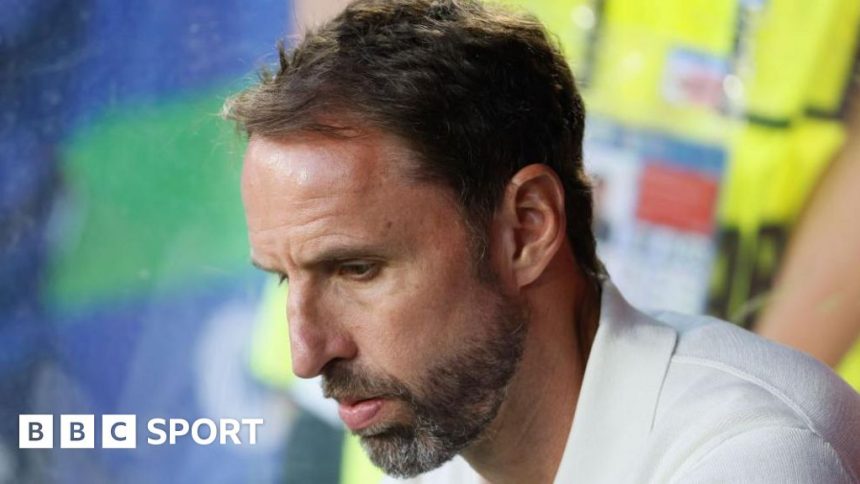Will fan fury shape Southgate’s England future?

England manager Gareth Southgate during the Euro 2024 draw with Slovenia
-
Published
Three large plastic cups hurled at Gareth Southgate from behind the goal in Cologne were the headline grabbers, but wider hostility aimed at England’s manager sharpened the sense that an era is coming to an end.
Southgate will have seen and heard the angry mood of supporters as he made his way across the pitch at the end of a grim goalless draw with Slovenia that at least ensured his side topped Group C at Euro 2024.
He still went to offer thanks but instead got a toxic reaction that – given Southgate’s previous statements saying “I will not outstay my welcome” – will surely play into his thinking when his future is clarified at the end of the tournament in Germany.
Southgate’s voice clearly faltered when he was asked on BBC Radio 5 Live if he was hurt by what had happened.
Normally a polished composed presence, here he hesitated over his words before saying: “Look, I’m not going to…I need them behind the team. I need them behind the team so it’s fine. I have to deal with that. I wasn’t going to back away from thanking people for coming and giving us support.”
He added: “I understand the narrative towards me and that’s better for the team than it being towards them, but it is creating an unusual environment to operate in.”
There were fans who supported Southgate and returned his applause but there was no mistaking the larger strength of ill-feeling among England followers, who also jeered at half-time but supported the team magnificently during the game.
When questioned pre-match about former England striker Gary Lineker’s graphic four-letter description of England’s display in the 1-1 draw with Denmark, Southgate insisted he had only just heard about it and said: “I am oblivious to it.”
This did not appear to be the case in Cologne, Southgate struggling momentarily to answer the question about whether he was wounded by the reaction before turning attention away from himself.
Gareth Southgate, with Phil Foden against Slovenia, has always protected his players before himself
It prompted an immediate flashback to almost exactly two years ago and a night at Molineux when Southgate suffered personal abuse after a 4-0 loss to Hungary in the Uefa Nations League, with chants of “you don’t know what you’re doing” ringing around the stadium.
Southgate was unnerved by the adverse reaction from fans to such an extent that it made him question whether his presence as manager was a problem that he might need to resolve himself by leaving. It had, certainly for a while, a profound effect upon him.
He stayed – then stayed again after the World Cup quarter-final defeat by France in Qatar in December 2022 when many inside the Football Association thought they would soon be looking for a new manager.
Southgate’s deliberations back then were shaped by the overwhelmingly positive reaction to England’s exit, demonstrating again that while he has always been willing to front up and shield his players at times of strife, he is fully tuned in to criticism and aware it has the capacity to spread.
This is why Southgate’s treatment on Tuesday and its subsequent fall-out has a wider significance.
Explaining his reasoning for staying on after Qatar, he told BBC Sport: “The last thing you want as a manager is that your presence is divisive and inhibits performance. I never want to be in a position where my presence is affecting the team in a negative way.”
What happened in Cologne revisited every concern Southgate has had about becoming a negative influence after eight years in charge. Will he step back from the brink this time?
It is very unlikely to be a tiny group using plastic cups as missiles that will exercise his mind come the end of Euro 2024 but the anger of the wider fanbase, despite England finishing at the head of their group.
Luke Shaw was included in Southgate’s squad despite being out injured since early February
He admits himself that he is unlikely to remain as England manager if they do not win Euro 2024 and even if they do triumph – a long stretch it seems on current form – moments like these are likely to come into calculations about his future given attention he has paid to them before.
England’s Euro 2024 has been a muddled, joyless affair so far, despite reaching the last 16 and having a pathway to the final that could be regarded as favourable if only they could actually play to the potential that made them pre-tournament favourites.
Previous tournaments have been outwardly, genuinely, optimistic and upbeat affairs but in Germany England have given the impression of being flat as they are reduced to answering detractors and defending poor performances while the manager has to discuss objects being thrown at him by his own supporters.
It has felt like a fire-fighting exercise since the fault lines in Southgate’s strategy were exposed by Denmark.
It has created an “end of days” atmosphere where every England display feels like a day nearer to the end of Southgate’s overwhelmingly positive time in charge.
The plus point for England is there is still time for the narrative to change and for Southgate to turn the criticism on its head, but there has been nothing so far to suggest this will happen.
Southgate’s managerial touch has also been unsure, especially when it comes to the heart of the team in midfield.
He admitted the decision to play Liverpool’s Trent Alexander-Arnold alongside Declan Rice was “an experiment”, which he ended after 54 minutes of England’s second game against Denmark. He was replaced by Chelsea’s Conor Gallagher against Slovenia but he was hauled off at half-time.
Manchester United teenager Kobbie Mainoo and Chelsea’s Cole Palmer impressed as substitutes to press their claims, although Phil Foden having to return home for personal reasons adds another layer of uncertainty.
Southgate has not been helped by captain Harry Kane’s struggles to make an impact and the dramatic dip in form of young superstar Jude Bellingham after his match-winning performance in the opening win against Serbia. He was horribly out of sorts as Slovenia kept England out, losing the ball 16 times and indulging in some poor body language when things did not go for him.
Cole Palmer and Kobbie Mainoo impressed as substitutes against Slovenia
Southgate’s decision to pick Manchester United’s Luke Shaw despite him being out with a hamstring injury since February, is also coming under scrutiny as he has often trained alone and shows no signs of being match fit. It has left England to operate with a right-footed left-back in Kieran Trippier, consequently unbalancing one side of the team.
England’s Euro 2024 squad may have been increased to 26, affording the odd luxury, but Shaw’s presence has so far added up to a wasted spot.
Anthony Gordon made a late appearance as a substitute and his frustration was also clear as he said: “I think we can do so much better, that’s the problem. We have such good players. Training is so good every day and then it’s just not clicking.
“Hopefully in the coming games it will because we need to start really attacking games and dominating teams.”
Southgate has made a habit of insisting he can close his ears to “external noise” but on this occasion it was too loud to ignore.
What impact that noise has on his decision-making process will become clear when England reach the end of the road at Euro 2024.
Related Topics
-
-
Published8 hours ago
-
-
-
Published12 hours ago
-
-
-
Published11 hours ago
-






